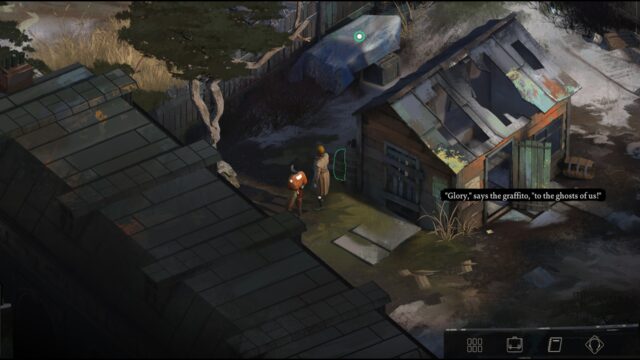Syndicate Review
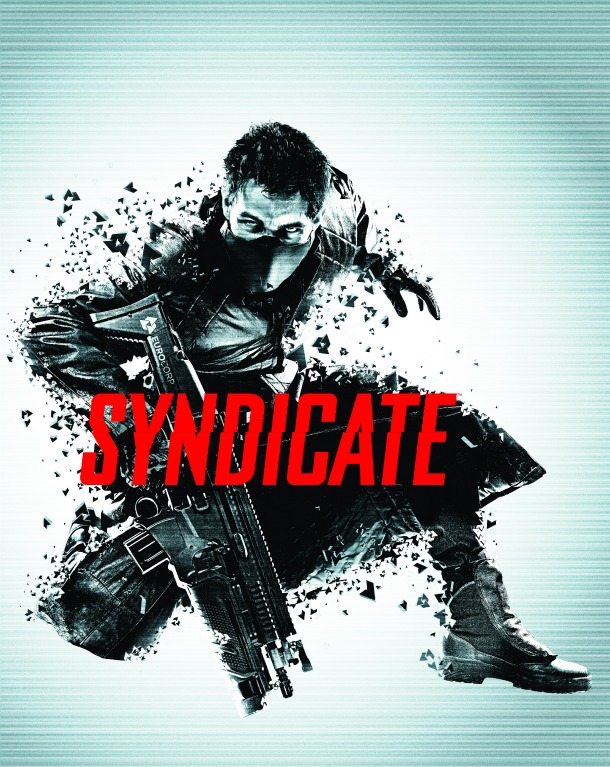
The new Syndicate, although it was supposed to take us into the future, in many ways remained a game from the past. It was even intuitively difficult to make the brain forget about the connection between this first-person shooter and the original 1993 game, which was essentially a strategy game. At times, it feels like the game is torn between two universes, trying to stand with one foot in the world created almost twenty years ago, and the other foot in the reality of modern shooters. Syndicate ended up being confined within the narrow boundaries of the FPS genre, which itself is experiencing significant stagnation due to the intensive use of it for game development over the years. After the release of masterpieces like Chronicles of Riddick and The Darkness, it would not have been difficult for the Swedish studio Starbreeze to inject some fresh blood (albeit with slightly modified DNA) into the genre, but unfortunately, Syndicate remains the most faceless and superficial work of this developer.
Part of the problem lies in the fact that, in accordance with the accepted philosophy of the FPS genre, the game was initially divided into two parts: single-player campaign and multiplayer. Such a decision initially seems shallow and predictable, and later you simply realize its blatant shortcomings (especially in the case of the four-player campaign). If these two parts were combined together using the approach previously employed by Starbreeze, Syndicate could have become a very interesting and unique game. In its current form, however, Syndicate, although it appears to be a solid average game, does not generate much interest.
The game’s storyline turned out to be weak and unremarkable. It has almost nothing in common with the storyline of the original 1993 game and is based on such clichéd narratives and gameplay mechanics that are simply incapable of eliciting positive emotions from players.
You play as Kilo, an agent of the Eurocorp syndicate with a biochip in your head, living in a dark future world where the rule of all-powerful corporations has long replaced the outdated concept of societal division based on nationality. These conglomerates wage wars against each other, abduct scientists for access to the latest cybernetic developments, sabotage enemy facilities, and kill the top management of competitors. Not coincidentally, as the main character, you are assigned missions of exactly this nature from the very beginning of the game and throughout its progression, which you carry out with the persistence and cold-bloodedness of a programmed executor.
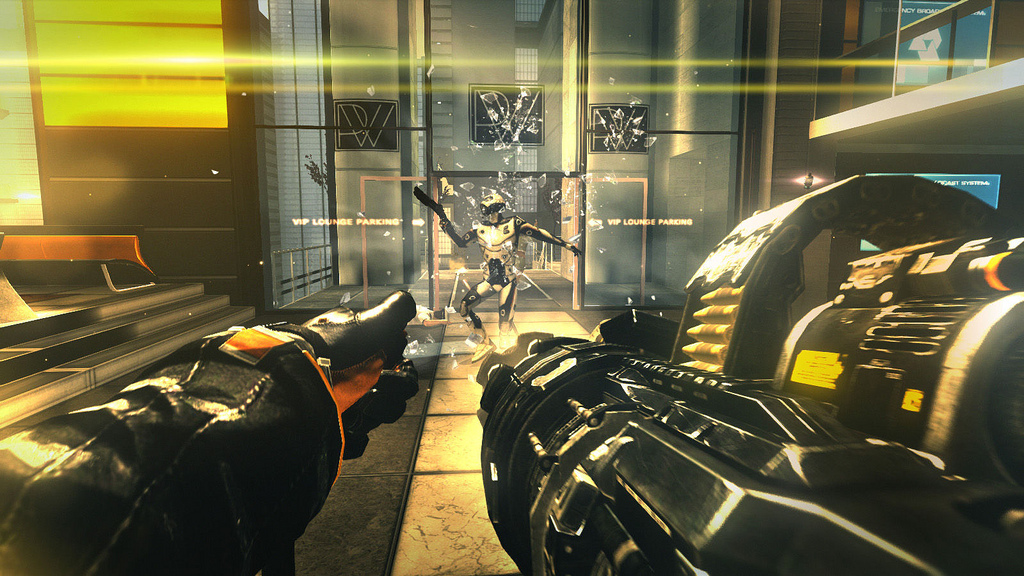
Where there is action in the game, it looks good. The weapon selection (as well as its characteristics) is impressive; the enemy AI is sufficient to make competing with them interesting; the locations are well thought out for both peaceful and military actions. Starbreeze knows how to present all of this. And, it must be said, they present it very well.
The “gimmick” of Syndicate is the ability to switch to a cyberpunk mode, which is provided by the DART-6 computer chip implanted in your head. By pressing the right bumper, the DART mode is activated for a limited time, during which time slows down, enemies are highlighted, weapons deal more damage, and your character overall feels more powerful. Undoubtedly, a useful feature, but it has been seen before in numerous shooters. Therefore, it cannot be called something extraordinary.
More interesting is the ability to remotely control various technologies using the chip (a kind of “superpower”), which is activated by holding the left bumper. The effects range from well-known hacking of doors and computer servers to manipulating enemy behavior. As you progress in the game, you receive three “upgrades” for your chip, which can be used to destroy enemy forces.
The first superpower is the “backfire” mode, where bullets fired by enemies hit themselves. The second is “suicide,” which causes enemies to explode, resulting in the defeat of everything living within a certain radius of the victim. And finally, the third is “persuade,” partially familiar to us from the original 1993 game. It allows you to brainwash enemies and summon them to fight on your side for a while. When consciousness returns to such an opponent, they end their life by suicide. All superpowers can only be used when their indicator is filled to 100%. Its level is replenished by headshots and during “special points” that need to be “caught” with the left bumper during active manipulation.
All of these abilities are not just interesting to use during gameplay, they are simply vital for you to stay alive. If you try to play Syndicate like a regular shooter – in the style of “run and shoot” – you will not succeed. To achieve success, you need to use the superpowers. However, over time, this becomes repetitive, as the gameplay does not offer other alternatives to diversify the strategy of completing the game.
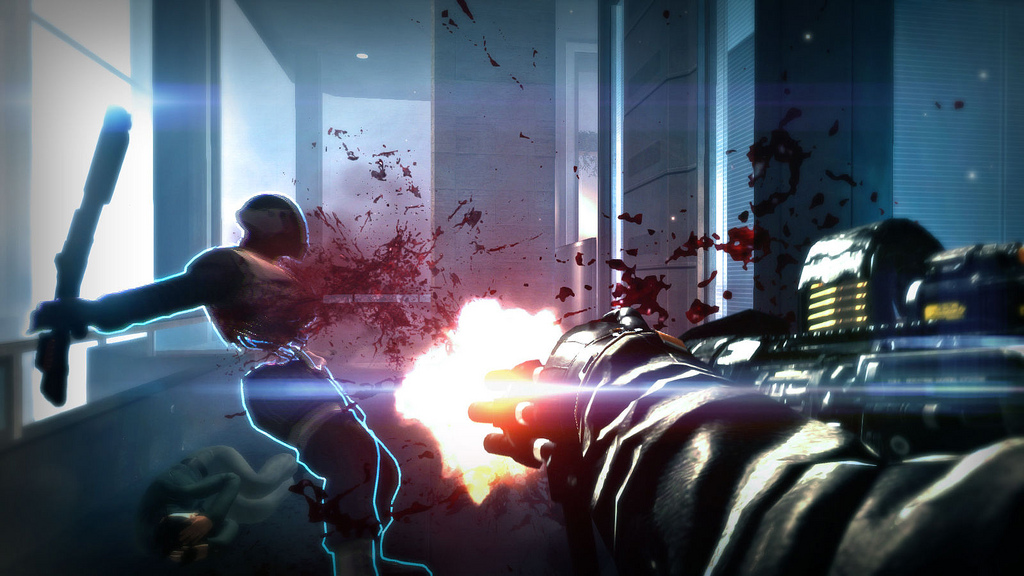
Not only does Syndicate’s perception also influence last year’s Deus Ex: Human Revolution, but its own legendary history as well. In both games, we encounter black-clad cyborg agents living in a cyberpunk future ruled by deceitful corporations. And in both cases, gameplay progress is determined by the abilities available to us. In Syndicate, any alternative always boils down to a clearly defined direct action. And besides the feeling of linearity and monotony in the game, it doesn’t evoke any other emotions. There are no hints of cunning or tricks, and for successful combat tactics, it is often enough to simply cause a malfunction in the fuel control system to trigger an explosion and blow everyone to pieces. That’s the whole tactic.
Of course, playing a quality shooter brings a lot of enjoyment. But Syndicate is only a poor imitation of such games. The overwhelming majority of damage to enemies is inflicted not so much by your good and accurate shooting, but by various explosions, suicides, etc. It seems that the game’s concept implies the use of a greater variety of gameplay tools, but in practice, it all comes down to some non-alternative mass acts of terrorism.
The storyline does not strive to hide the residue of the game’s unrealized genre potential. It is another science fiction tale in which, according to the genre’s laws, at one beautiful moment, your hero discovers that – imagine that! – his corporate masters are far from being the nicest people on Earth. Knowing that besides your hero, there are only three main characters in the game and that one of them is voiced by Brian Cox, you don’t have to be a genius to guess who exactly represents universal evil and becomes your main enemy.
Despite the clichéd initial stage of the plot, it could have had many development options. But not here: its main part is also blatantly weak. Representing a short campaign that lasts only a couple of hours, it hastily takes us from one predictable plot point to another. Mostly, the speed of completing the game is influenced by how quickly you can adapt to the annoying boss battles (another similarity between Syndicate and Deus Ex).
The cooperative mode is better: here, there is a broader storyline that has almost nothing in common with the single-player campaign. The cooperative story is a chain of objective-oriented missions that follow one after another. It seems that it is precisely in this mode that Starbreeze Studios managed to grasp the pulse of the game.
And it’s not just because the four-player game mode resonates in meaning with the full-fledged quartets of agents from the original 1993 version, wandering through cities and wanting to avenge the all-powerful corporations. The new Syndicate has additional features and improvements that fit perfectly. The same manipulation and superpower mechanism is used, but in the four-player game, it opens up much wider possibilities than in the single-player campaign.
The range of weapons has also expanded. Basic modifications can be replaced with enhanced and improved samples that are encountered throughout the game. The same can be said for available upgrades for the DART-6 chip. Now, with its help, you can protect and replenish the health of nearby teammates, as well as perform other useful collective functions. In the four-player game mode, further gameplay progress is stimulated by broader possibilities, and the desire to explore something new never leaves you.
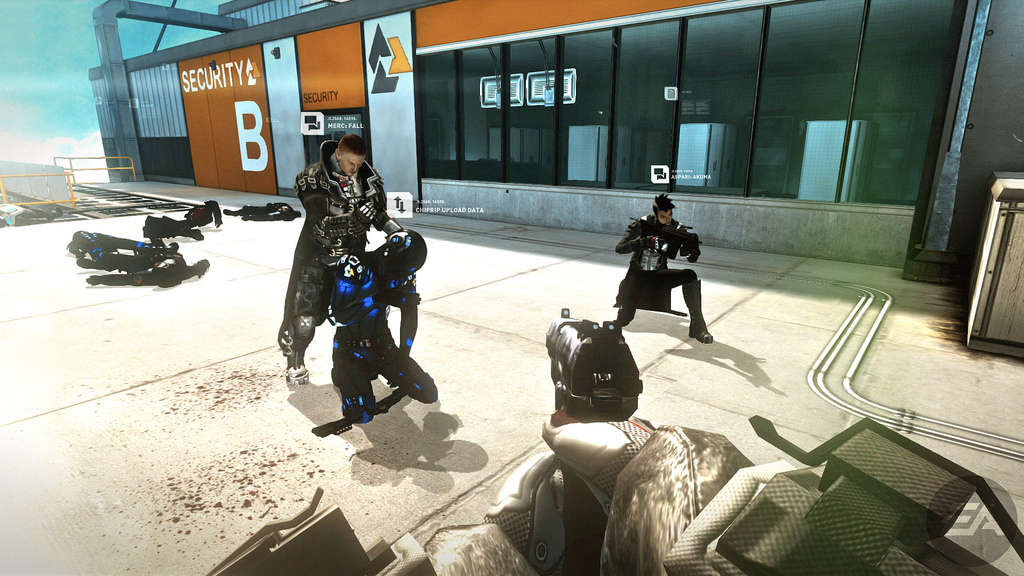
It is also important that in this mode you are free from the constraints of the class system. You can choose a sniper rifle as your secondary weapon and “take out” enemies from a distance while allies carry out the main mission objectives. You can get closer to the main battlefield and be a medic, providing assistance to injured colleagues, then take a minigun, activate additional defense, and temporarily become a tank. Comrades who are near death can be “revived”: the time it takes to fully bring them back to life depends on the severity of their injuries and their remaining life force.
Each time in multiplayer games, you can find an interesting and useful role for yourself to achieve victory as a team. While someone is stealing and disabling computer servers, someone needs to cover the rear, protecting transportation from those who want to seize it. Of course, in Syndicate, there are not as many options for battle development as in Battlefield 3, but they are definitely more interesting than in many cooperative shooters.
Unlike linear algorithms in single-player campaigns, where all doors are closed except for the one you need, there are many more possibilities for events to unfold in cooperative game maps. You can enter and exit different rooms, fortify escape routes, and take other actions: in general, the game environment here is much wider and more dynamic than in a typical corridor shooter. At the same time, you constantly feel the support of your team (and at the same time responsibility for it), and properly used superpowers can make the game world more alive and vibrant – just like it was in the original Syndicate of 1993, not like what we saw in the single-player version. You can even establish your own syndicate clan: fortunately, there are many ways to increase your arsenal and expand your agency network.
The four-player Syndicate variant is so good that it will most likely surpass the single-player campaign in popularity. But despite all its positive aspects, there are also some drawbacks: enemies appearing according to scripts on different maps become more of a memory exercise than dangerous opponents catching you off guard; the presence of checkpoints means that you need to complete all the tasks in a mission before moving on. The number of upgrade options is also not infinite, and sooner or later you find yourself thinking that you know almost everything about this game.
Like many other modern shooters, Syndicate is a product that is meant to appeal to everyone at once, but in the process of playing, its strong points, one after another, turn out to be quite mediocre. The game is superficial: you can play it a couple of times if you want to shoot to your heart’s content, but that’s not enough for Syndicate to stand out among other representatives of the cyberpunk crowd.
If Starbreeze had disregarded conventions and made a full-fledged shooter with elements of strategy for multiple players, it would undoubtedly have been successful. In its current form, the game is more like another faceless work of game art, the interest in which is fueled in the early days after its release, but after a few months, no one will remember it. Play Syndicate and enjoy the four-player game mode, but don’t expect this game to live in memory longer than the recognized leaders of the FPS genre.
Share
Discuss
More Reviews


